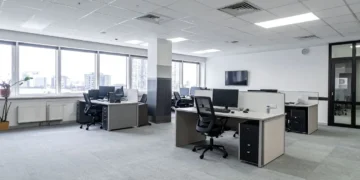- Real estate landlords are taking a more active role in the flexible workspace industry and are using coworking to improve the value of their properties.
- Landlords and flexible workspace operators are increasingly leveraging joint-venture agreements, or landlord partnerships, and are reaping the benefits.
- Here we take a closer look at the landlord agreements that Convene, Industrious and JustCo have signed.
About a year and a half ago, real estate landlords started to have a more active role within the flexible workspace industry. Coworking went from the misunderstood child to the favorite child as property owners began to realize that flexible workspace could help improve a property’s value.
Suggested Reading: “Do Coworking Spaces Positively Impact Property Value?”
Flexible space solutions have revolutionized the way people use, buy, lease, and experience workspace. As a result, the past 18 months have seen an interesting crossover between the CRE and coworking industries, mainly landlords and flexible workspace operators increasingly leveraging joint-venture agreements (otherwise known as landlord partnership) in order to truly reap the benefits.
The advantages are two-fold. On the one side, landlords can improve their property value, while coworking space operators can expand their footprint at a fraction of the cost, as the landlord would help absorb some of the initial costs involved with launching a coworking space.
Suggested Reading: “The Top 5 Ways CRE Is Crossing into the Coworking Industry”
Several flexible workspace operators have started to partner with landlords, including The Wing, JustCo, The Work Project, Knotel, Central Working, COHatch, and many others. However there are three operators that are proving that this business model not only works, but is, in fact, the future of the industry.
Top 3 Flexible Workspace Operators Nailing Landlord Partnerships
1. Convene
In an interview with Allwork.Space earlier this year, Nick LiVigne, VP of Product at Convene, stated that “the companies that will survive and thrive in space-as-a-service in the long run will have a healthy partnership model”. The company’s success (to date Convene has raised $260 million in equity funding) is a good indicator that LiVigne is onto something.
Over the past 12 months, Convene has partnered with Thuzio, Hydra, AXA IM – Real Assets, Brookfield Properties, CommonWealth Partners, Beacon Capital Partners, RXR Realty, and Hines, among others. By the end of this year (2019), Convene is expected to have 30 locations across six markets, totaling 1,500,000 square feet of space.
2. Industrious
Early last year (2018), Jamie Hodari, co-Founder and CEO of Industrious, announced that the company would switch to management contracts with landlords to power the company’s growth. True to Hodari’s word, Industrious has made the news over the past 12-18 months for partnering with various landlords and raising a significant amount of money. Most recently, Industrious made the news for raising $80 million in a Series D funding round and announcing that it expects to be profitable by the first quarter of 2020.
To date, Industrious has secured over 20 landlord partners, including Hines, EQ Office, Macerich, Jamestown LP, Rubenstein Partners, ShopCore Properties, Coretrust, Asana Partners, Seritage Growth Properties, and many others. The company has stated that management contracts represent more than 80% of the company’s 2019 deals.
Industrious currently operates over 75 flexible workspace locations across 40 US cities. Following the recent Series D funding round, the company has raised a total of $222 million.
3. JustCo
As of June of this year, Singapore-based coworking space operator JustCo has over 30 coworking spaces across eight cities in Asia Pacific. The company aims to grow its presence to 100 coworking locations in APAC by the end of 2020.
Notable landlord partners of JustCo include GuocoLand, Gunung Sewu Group, Frasers Property, TICON, and Novum Global Ventures. JustCo is currently valued at about $200 million after a 2017 Series B round led by Sansiri. The company is reportedly seeking to raise $550 million in a Series D funding round in the near future.



 Dr. Gleb Tsipursky – The Office Whisperer
Dr. Gleb Tsipursky – The Office Whisperer Nirit Cohen – WorkFutures
Nirit Cohen – WorkFutures Angela Howard – Culture Expert
Angela Howard – Culture Expert Drew Jones – Design & Innovation
Drew Jones – Design & Innovation Jonathan Price – CRE & Flex Expert
Jonathan Price – CRE & Flex Expert











